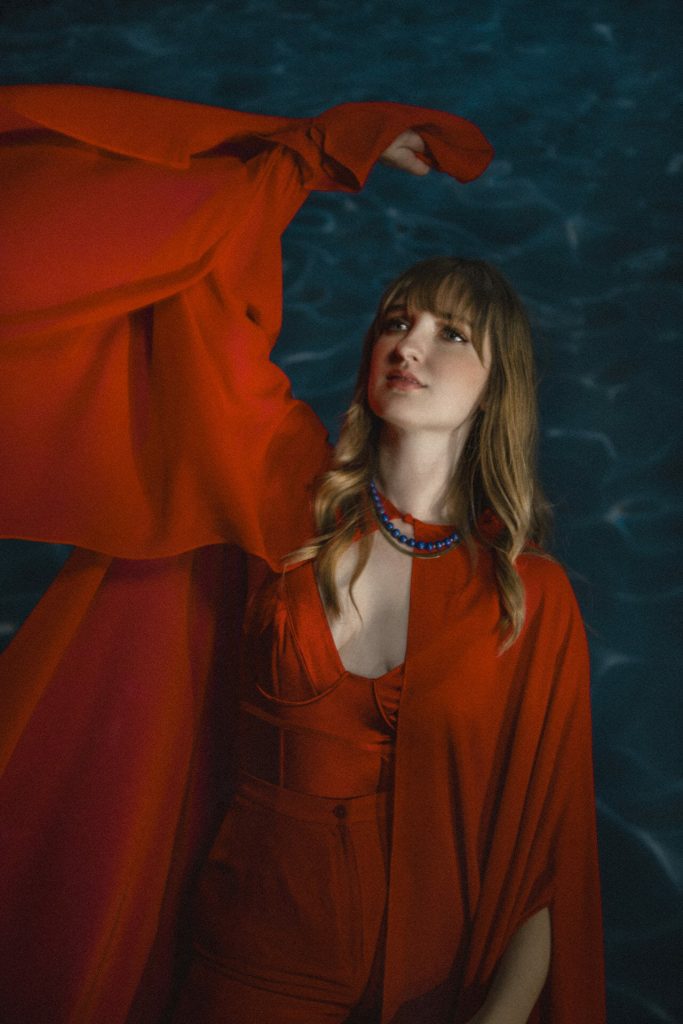
Madison Cunningham’s music is slippery and deceptive, impossible to pin down with cheap comparisons or PR lingo. She may draw you in with her guitar riffs—intricate, experimental and rhythmically dense. Perhaps it’s her voice, rich in country-rock earthiness yet expressive on a technical level teetering on jazz. Maybe it’s the vividly painted character portraits that anchor her lyrics. Whatever your entry point is, the California native expertly balances weirdness and warmth on her second LP, Revealer. And that’s her ultimate goal.
“A friend put it to me once: ‘Some people like being weird for the sake of being weird,’” she says. “But I don’t know if that’s the best outcome for me. There are two faders I’m riding—my weirdest instincts and the singer-songwriter who wants to be understood.”
It’s been a curvy road of creative—and personal— discovery. A pastor’s daughter, Cunningham honed her chops playing music in church, and recorded 2014’s faith-fueled Authenticity, a self-released worship LP when she was still a teenager. Yet as her taste—and perspective—evolved, so did her tunes.
“I’ve always been interested in thinking beyond folk/ singer-songwriter terms,” she says. “But as I started falling deeper in love with the guitar and started discovering these other artists, I just found so much music. That’s when I started to naturally combine [sounds], taking the singer[1]songwriter thing in a more exploratory direction.”
Cunningham had a lot of early role models for expanding her range, including Fiona Apple, Björk and Rufus Wainwright. But the most crucial may have been Argentinian singer-songwriter Juana Molina, who similarly straddles the line between progressive arrangements and pop accessibility. “She’s the first person I heard mess with time signatures like that,” Cunningham says, surveying her own fascination with 7/8. “[Molina] does it in such a natural way that you almost don’t hear it until you know what’s happening.”
And, before long, she was collaborating with some musical giants: In 2017, she joined the versatile cast of Punch Brother Chris Thile’s Live From Here radio variety show and, two years later, she added guest vocals to Andrew Bird’s album My Finest Work Yet. By then, the outside world had caught on: She picked up Grammy nominations for her proper debut LP, 2019’s Who Are You Now (Best Americana Album) and the extended version of her 2020 covers EP, Wednesday (Best Folk Album). But she had to muster up every ounce of artistic mojo for Revealer, an even more ambitious follow-up somehow crafted under a post[1]tour time crunch.
“A lot of the songs, while I’m so proud of them, were not written in joy—they were written out of duty,” she says. “It was the most challenging time I’ve had as a writer because my will was not there. It gave me the tools for when you just don’t feel like doing anything—or you’re in the middle of the pandemic.”
At that early stage, she had only one full song in her back pocket. Still, she plunged forward. The plan was to write one track per week, fleshing out the results at a North Hollywood studio. “That sort of worked, but something would fall apart where the song wasn’t quite ready,” she admits. “I ended up working with [Who Are You Now producer] Tyler Chester, before flying to Portland, Ore., where I [worked] with Tucker Martine. And then I flew to Nashville and did several songs with Mike Elizondo. It was this crazy process, and by the end of it, I was like, ‘Oh, my God, does any of this fit together?’ But by the time we did the sequencing, it was like, ‘Whew, it all works.’”
Revealer indeed covers the full gamut of her songwriting styles—the Radiohead-gone-Afrobeat fingerpicking of “All I’ve Ever Known,” the crusty twang of “Hospital,” the woozy and delicate art-folk of “In From Japan,” the nervy indie[1]rock of “Your Hate Could Power a Train,” the latter of which nearly fell apart in the studio.
“I finished the lyrics the literal minute before I had to sing the final vocal,” she says with a laugh. “I was shaking singing that song. Talk about procrastination. Thinking about it makes me nervous still.”
The album’s heartbeat, though, is “Life According to Raechel,” an aching orchestral ballad about the deep grief she experienced upon her grandmother’s death. The most profound lyric could be “Were your eyes green/ Were they blue?”—a reminder about the small details we often take for granted in the people we love.
“I really leaned into [the guilt] because that was my main reaction to losing a grandmother,” she says. “My mind really went to that—‘I have no idea what her eyes looked like.’ My friend and I always ask ourselves, ‘How can you write about universal things that are sometimes morbid and heartbreaking in a way that makes you not want to die? How do you write about them in a way that brings more clarity or sweetness?’ That’s forever a mystery to me.”
It makes sense that Cunningham would tackle such a weighty topic in a style unique to her. After all, every songwriting choice she makes— an out-of-left-field guitar tone, a change in meter, a sing-along chorus—feels designed to make the familiar a tad foreign, the breezy a little bizarre.
“It doesn’t matter how you start the song,” she says. “It just matters how you finish it.”
